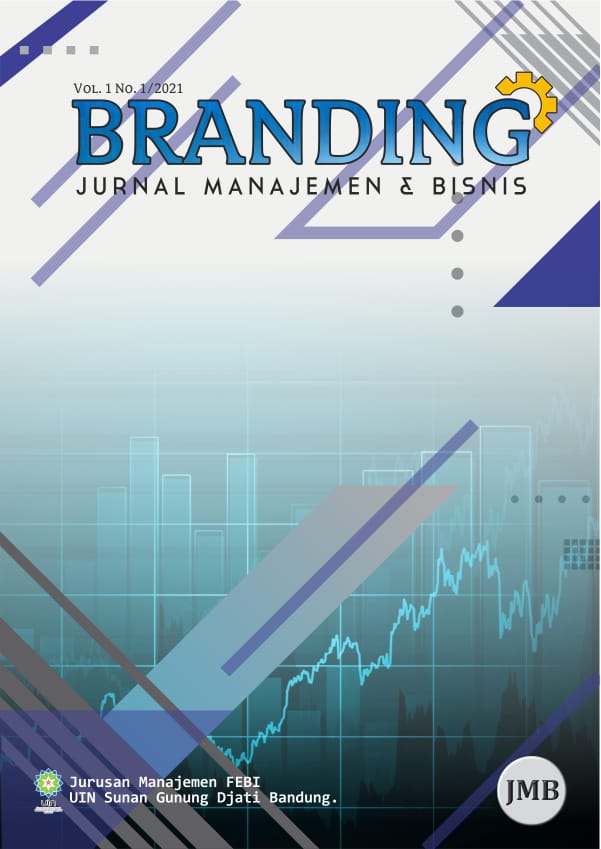DIGITAL TRANSFORMATION IN SUPPLY CHAIN MANAGEMENT: THE IMPACT OF BLOCKCHAIN TECHNOLOGY IMPLEMENTATION ON OPERATIONAL EFFICIENCY
DOI:
https://doi.org/10.15575/jb.v3i2.44434Keywords:
Digital Transformation, Supply Chain Management, Blockchain Technology, Operational Efficiency.Abstract
References
Attaran, M. (2020, July). Digital technology enablers and their implications for supply chain management. In Supply Chain Forum: An International Journal (Vol. 21, No. 3, pp. 158-172). Taylor & Francis.
Badwan, N. (2024). Role of supply chain partnership, cross-functional integration, responsiveness and resilience on competitive advantages: empirical evidence from Palestine. The TQM Journal.
Chen, C. L., Lin, Y. C., Chen, W. H., Chao, C. F., & Pandia, H. (2021). Role of government to enhance digital transformation in small service business. Sustainability, 13(3), 1028.
Dubey, R., Bryde, D. J., Dwivedi, Y. K., Graham, G., Foropon, C., & Papadopoulos, T. (2023). Dynamic digital capabilities and supply chain resilience: The role of government effectiveness. International Journal of Production Economics, 258, 108790.
Frank, A. G., Mendes, G. H., Ayala, N. F., & Ghezzi, A. (2019). Servitization and Industry 4.0 convergence in the digital transformation of product firms: A business model innovation perspective. Technological Forecasting and Social Change, 141, 341-351.
Fu, Q., Abdul Rahman, A. A., Jiang, H., Abbas, J., & Comite, U. (2022). Sustainable supply chain and business performance: The impact of strategy, network design, information systems, and organizational structure. Sustainability, 14(3), 1080.
Habib, G., Sharma, S., Ibrahim, S., Ahmad, I., Qureshi, S., & Ishfaq, M. (2022). Blockchain technology: benefits, challenges, applications, and integration of blockchain technology with cloud computing. Future Internet, 14(11), 341.
Helo, P., & Hao, Y. (2022). Artificial intelligence in operations management and supply chain management: An exploratory case study. Production Planning & Control, 33(16), 1573-1590.
Kalajdjieski, J., Raikwar, M., Arsov, N., Velinov, G., & Gligoroski, D. (2023). Databases fit for blockchain technology: A complete overview. Blockchain: Research and Applications, 4(1), 100116.
Khedr, A. M. (2024). Enhancing supply chain management with deep learning and machine learning techniques: A review. Journal of Open Innovation: Technology, Market, and Complexity, 100379.
Kmiecik, M. (2022). Logistics coordination based on inventory management and transportation planning by third-party logistics (3PL). Sustainability, 14(13), 8134.
Leal-RodrÃguez, A. L., SanchÃs-Pedregosa, C., Moreno-Moreno, A. M., & Leal-Millán, A. G. (2023). Digitalization beyond technology: Proposing an explanatory and predictive model for digital culture in organizations. Journal of Innovation & Knowledge, 8(3), 100409.
Negi, S. (2021). Supply chain efficiency framework to improve business performance in a competitive era. Management Research Review, 44(3), 477-508.
Pahleviannur, M. R., De Grave, A., Saputra, D. N., Mardianto, D., Hafrida, L., Bano, V. O., ... & Sinthania, D. (2022). Metodologi penelitian kualitatif. Pradina Pustaka.
Plekhanov, D., Franke, H., & Netland, T. H. (2023). Digital transformation: A review and research agenda. European management journal, 41(6), 821-844.
Raja Santhi, A., & Muthuswamy, P. (2022). Pandemic, war, natural calamities, and sustainability: Industry 4.0 technologies to overcome traditional and contemporary supply chain challenges. Logistics, 6(4), 81.
Rogerson, M., & Parry, G. C. (2020). Blockchain: case studies in food supply chain visibility. Supply Chain Management: An International Journal, 25(5), 601-614.
Siagian, H., Tarigan, Z. J. H., & Jie, F. (2021). Supply chain integration enables resilience, flexibility, and innovation to improve business performance in COVID-19 era. Sustainability, 13(9), 4669.
Sicari, S., Rizzardi, A., & Coen-Porisini, A. (2022). Security&privacy issues and challenges in NoSQL databases. Computer Networks, 206, 108828.
Tarigan, Z. J. H., Siagian, H., & Jie, F. (2021). Impact of internal integration, supply chain partnership, supply chain agility, and supply chain resilience on sustainable advantage. Sustainability, 13(10), 5460.
Tseng, C. T., & Shang, S. S. (2021). Exploring the sustainability of the intermediary role in blockchain. Sustainability, 13(4), 1936.
Uemura Reche, A. Y., Canciglieri Junior, O., Szejka, A. L., & Rudek, M. (2022). Proposal for a preliminary model of integrated product development process oriented by green supply chain management. Sustainability, 14(4), 2190.
Van Veldhoven, Z., & Vanthienen, J. (2022). Digital transformation as an interaction-driven perspective between business, society, and technology. Electronic markets, 32(2), 629-644.
Wiedmer, R., & Griffis, S. E. (2021). Structural characteristics of complex supply chain networks. Journal of Business Logistics, 42(2), 264-290.
Zaabar, B., Cheikhrouhou, O., Jamil, F., Ammi, M., & Abid, M. (2021). HealthBlock: A secure blockchain-based healthcare data management system. Computer Networks, 200, 108500.
Downloads
Published
How to Cite
Issue
Section
Citation Check
License
Copyright (c) 2024 Branding: Jurnal Manajemen dan Bisnis

This work is licensed under a Creative Commons Attribution-ShareAlike 4.0 International License.

This work is licensed under a Creative Commons Attribution-ShareAlike 4.0 International License.
















